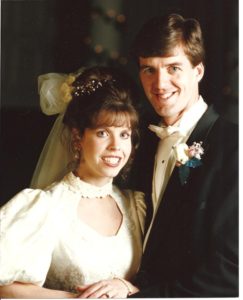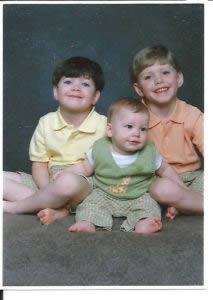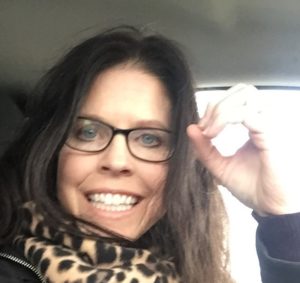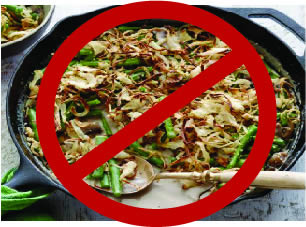A No Casserole Illness, Part 1
 “When I was finally ready to share my diagnosis of bipolar disorder with the church, I was told it was probably not a good idea to go public with it. That same day, the wife of a male church member shared her husband’s cancer journey and asked for prayers. Many church members rallied around her to pray and signed up to bring meals,” Diane* shared.
“When I was finally ready to share my diagnosis of bipolar disorder with the church, I was told it was probably not a good idea to go public with it. That same day, the wife of a male church member shared her husband’s cancer journey and asked for prayers. Many church members rallied around her to pray and signed up to bring meals,” Diane* shared.
* Her real name is used with permission.
A No Casserole Illness
“I learned that day mental illness is a no casserole illness. You won’t have people praying for you or signing up to bring meals to your family like you would if you had a physical illness.” The stigma associated with mental illness is serious problem in that it can have a detrimental impact on those who are living with those disorders. Experiencing discrimination, reluctance to seek help, a lack of understanding, fewer opportunities for work, being excluded in social activities, being bullied, and believing they’ll never get better are just a few of the devastating blows those with mental illnesses suffer on a regular basis. The following statistics, taken from the National Alliance on Mental Illness, show the prevalence of mental illness.

- Approximately 1 in 25 adults in the U.S.—9.8 million, or 4.0%—experience a serious mental illness in a given year that substantially interferes with or limits one or more major life activities.
- 2.6% of adults in the U.S. live with bipolar disorder.
- Mood disorders, including major depression, dysthymic disorder and bipolar disorder, are the third most common cause of hospitalization in the U.S. for both youth and adults aged 18–44.
With these numbers, it is very likely we are friends with or love someone with a mental illness. We MUST drop the stigma! How can we continue to treat mental illness as a no casserole illness?
Result of a Traumatic Event
 Mental illnesses are often linked to a person’s heredity and/or is the result of a traumatic event. Diane believes her bipolar disorder was passed down from her father who was not compliant with his treatment. His violent erratic behavior exposed Diane to years of physical spousal abuse, which filled her with fear. She also experienced years of trauma at the hands of her step-father. From the time Diane was six until she was sixteen, her step-father sexually abused her. “My emotions were erratic with mood shifts and suicidal ideations all throughout high school. At age 15, I swallowed a combination of 60 pills I stole from the medicine cabinet at home. A teacher called 9-1-1. I lied about why I attempted suicide when I was forced to talk to a psychiatrist.”
Mental illnesses are often linked to a person’s heredity and/or is the result of a traumatic event. Diane believes her bipolar disorder was passed down from her father who was not compliant with his treatment. His violent erratic behavior exposed Diane to years of physical spousal abuse, which filled her with fear. She also experienced years of trauma at the hands of her step-father. From the time Diane was six until she was sixteen, her step-father sexually abused her. “My emotions were erratic with mood shifts and suicidal ideations all throughout high school. At age 15, I swallowed a combination of 60 pills I stole from the medicine cabinet at home. A teacher called 9-1-1. I lied about why I attempted suicide when I was forced to talk to a psychiatrist.”
During college, Diane met with a Christian counselor and then a counselor who specialized in sexual abuse. Her moods were on top of the world one minute and then would shift to being in the pits of despair. “I felt like I had multiple personalities,” Diane remembers. Desperate for help, she agreed to take Prozac, but it sent her into a state of hypomania. “I was on energy overload, skipping work and excelling at school, but on the other hand, I was making poor decisions and driving recklessly. I decided to quit taking my meds. When I did that, I slipped right back into depression.”

When she was 22, she made a move from Texas to Georgia so she could pursue a graduate degree in professional counseling. She met a young guy named Tim her first day in Atlanta. A study of mood disorders in one of her classes caused Diane to think, “The last thing I’d want to have is bipolar disorder or schizophrenia.” Deep down, Diane knew the symptoms of bipolar disorder described her struggles. But at that time, she was too prideful to admit she had a mental illness. When Tim and Diane married in 1995, he was aware of the sexual abuse from her childhood. “I used it as the reason for my erratic behavior. He took it at face value and didn’t question it.”
Symptoms Became Much Worse

Diane was incredibly busy with her first two sons who were born 16 months apart. She experienced some mania and depression symptoms, but she kept them at bay. However, her symptoms became much worse after the birth of her third son. “I went loo-loo,” Diane remembers. “I tried to hide my erratic emotions, the physical sensations of numbness and tingling, the crying fits, but hiding it made it worse. My brain was full with nowhere to go. It built up until it exploded.” Her gynecologist thought she was experiencing postpartum depression, so he recommended she take an antidepressant. After a period of going back and forth about taking the medicine, she realized she needed it. “I cannot control my symptoms anymore. They’re controlling me,” she told her gynecologist.
Because the first antidepressant didn’t work, he prescribed her a different one. Soon after taking it, she remembers feeling life had color again. But that color-filled view didn’t last long. Three days later, Tim came home to find their crying baby in the crib and Diane dead asleep. Diane called her gynecologist and said, “I do not have any quality of life, and it’s cruel and inhumane to expect me to want to be here.” He became alarmed and replied, “I don’t know this Diane. I’m going to get you an appointment to see someone today.” That afternoon, Diane sat in front of a psychiatrist. After a series of questions, Diane stopped him mid-sentence and said, “I DO NOT have bipolar disorder.” He replied, “Yes, you do. You are a textbook case.”
Long, Rocky Road to Recovery
 “At that point, I had counseled people with disorders. And now I was in the hot seat. I had to deal with my pride about having a mental illness,” Diane remembers. With Diane’s official diagnosis at age 34, ten years after reading about it and knowing it was true, Diane insisted Tim go to an appointment with her. “You need to meet the doctor if this is my new life,” she said. This was the start of Diane’s long, rocky road to recovery. Since her diagnosis, she’s tried 26 different medications with the hopes of being stabilized. This road has also included 10 different doctors, 4 hospitalizations, and 1 residential treatment center. You won’t want to miss the best part of Diane’s overcomer story. Read it next Friday!
“At that point, I had counseled people with disorders. And now I was in the hot seat. I had to deal with my pride about having a mental illness,” Diane remembers. With Diane’s official diagnosis at age 34, ten years after reading about it and knowing it was true, Diane insisted Tim go to an appointment with her. “You need to meet the doctor if this is my new life,” she said. This was the start of Diane’s long, rocky road to recovery. Since her diagnosis, she’s tried 26 different medications with the hopes of being stabilized. This road has also included 10 different doctors, 4 hospitalizations, and 1 residential treatment center. You won’t want to miss the best part of Diane’s overcomer story. Read it next Friday!







Diane, I am grateful for your story. Thank you for being so transparent. I have watched my dad suffer all my life with severe depression. I, too have felt like why is no one praying for him and coming to visit him and encourage him from the church? I have come off a season of supprsssed anger that turned into depression. I felt lost and isolated. I thought the same thing you did – when you have cancer everyone rallies around you. Depression is a cancer of the mind and soul and it is lonely and isolating. I agree that we need to keep bringing these stories to the forefront and the church must be there for sufferers. Praying for you! I’m here for whatever you need. Love, Holli
Holli, I’m so sorry to hear about the lack of support your dad has received. It’s unfortunate that your dad along with countless others suffer in silence.
Well said, “Depression is a cancer of the mind and soul”.. I’m also sorry to read that you too have suffered from depression. It’s a very isolating and lonely disease. I’ would make you a casserole but I don’t cook. I will commit to pray for both you and your dad.
I have no answers for how to be there for those who battle, I have not done this well on any level. I fear the space I felt this dear friend was asking for actually sent a message that I didn’t care. She is a precious gift to all who know her and I could not be prouder of how she is giving life to so many others by giving the gift of going first.
Diane – I have no doubt God is supremely pleased with you. Like a proud father watching his child take the next difficult step towards healing and progress, God knows the faith it’s taken for you not to abandon your faith and to share your story. Your story will be a powerful tool He uses to soothe, heal and restore so many who share your struggle. As Christians our hope is in God’s ability to make something beautiful from our pain if we’ll let ourselves be used. Thank you for being a willing vessel through which he can touch so many.
Thank you so much for your encouragement. I’ve learned with my daily challenges that this illness and most others are not possible without God. The struggles are not pretty but like you said God has a way of making them beautiful.
Tami,
Your reply to this post speaks volumes about your love for me. I am grateful for the prayers you have offered up on my behalf and the challenges of others you may know. We are not all called to be in the trenches of the illness but to pray for peace and hope for those of us who plummit into the pits of darkness. I would not be here today if it weren’t for God’s grace and the prayers of those around me.
I was told by a church member that my depression was due to the fact that I had a weak faith and did not trust Jesus enough. Needless to say-I stopped talking to her. I can so relate to the world being in color again. With my medication-the world is in color and I feel like I am standing on level ground. Without it I feel like I am in a dark hole struggling to see the light at the top of the hole, scraping and fighting to get back onto level ground. Post partum depression hit after my second child and the violent death of my brother in law. This affected my husband and my mother in law so dramatically-naturally. I have tried over the years to stop taking medication. I had a pastor tell me that if I was diabetic I would take my insulin or if I had high blood pressure I would take my medicine. But you are right with the stigma of mental health. No one thinks twice about the diabetic, etc. But mental health is looked at as a weakness, a character flaw. When I counsel patients (I am a nurse practitioner) I will often share that I have depression/anxiety as well. If we DO NOT talk about it as we do other illnesses-we will never change the stigma. So I take my medication. And I don’t worry about it anymore! I get how you feel. Totally.
Shannon,
I totally missed your reply to the no Casserole Illness story. Though the church welcomes “everyone” with open arms, they have a ways to go in their acceptance of mental illness. At least for me ,they are attempting to chisel away at the stigma. Like you, I jump at opportunities to speak on its behalf. Who better to educate others than those of us who suffer. I’m sure you are an encouragement to all you come in contact with. You encouraged me to stay strong in my journey. This stuff ain’t easy!!!
May God give you all your needs as you continue to recover.